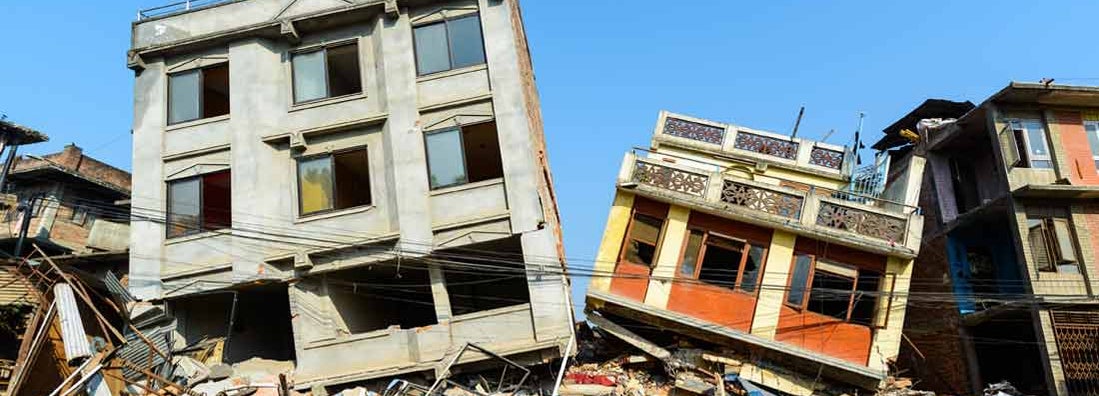Nevada Earthquake Insurance
Find the right earthquake insurance policy for you.

Nevada may not experience and receive the same attention concerning earthquakes that California does, but Nevada does endure just as many earthshaking events. Because residents of the Battle Born State are no strangers to earthquakes of magnitude 5.0 or higher and deal with aftershocks and tremors on a regular basis, they should consider having earthquake insurance. Before you search for earthquake insurance quotes, however, there are several factors to consider.
Use our independent agent matching system to find the best insurance plan in your area. You tell us what you’re looking for, and our technology will recommend the best agents for you. Any information you provide will be sent to only the agents you pick. We do not sell to third parties.
Nevada Earthquake History
These facts are available from the United States Geological Survey:
- The earliest reported earthquake in Nevada occurred in 1851. A newspaper article in 1865 cited reports of an earthquake 13 years earlier near Pyramid Lake. The account stated that great cracks opened from which water spouted 100 feet high. The account also reported large landslides.
- On Dec. 20, 1932, a magnitude 7.3 earthquake originated in west-central Nevada. The area around the epicenter, near Cedar Mountain, was almost uninhabited.
- A study by the University of Nevada in 1965 tabulated 1,173 "felt" events with epicenters within the State between 1852 and 1961.
- Two earthquakes, registering 5.0 and 6.0, occurred in Nevada during 2008 alone.
- Nevada ranks third in the United States for seismological activity with earthquakes of magnitude 5.0 or higher. Only Alaska and California are more active.
What Is Earthquake Insurance?
Because standard homeowners insurance does not typically cover earthquakes, it's important for property owners in seismically active areas to obtain riders to provide some level of earthquake protection for their property.
These riders generally mean a high deductible but provide substantial coverage in the event that a significant seismic event destroys your home. Earthquake insurance includes coverage for damage to the foundation or basement, the overall structure of the home, and the interior of the home.
However, insurance providers vary significantly in their earthquake coverage. Some policies will cover accessory structures such as garages, while others cover damage only to the home. Only some of the more comprehensive plans will provide coverage for personal belongings in your home.
Why Is Earthquake Insurance Important in Nevada?
Some folks mistakenly believe they can rely on federal disaster aid if a severe earthquake strikes their area. Unfortunately, many do not realize how slow that aid is in coming. First, Congress must declare your area a federal disaster zone. When politics are involved, sometimes this declaration can take weeks or even months. Second, when the aid is finally available, homeowners discover that the assistance is in the form of loans for those who qualify and they must pay back those loans.
You need not pay back an insurance claim, however. The reimbursement is often light years ahead of federal assistance funds and can help you recover much more quickly following an earthquake.
How Does Earthquake Insurance Work?
Unlike the traditional homeowners insurance policy where you can choose the deductible, earthquake insurance usually has a set deductible tied to the value of your home, typically between 10 and 15 percent. For example, if your home were worth $300,000, your earthquake insurance deductible would be around $30,000 to $45,000. That may seem like a lot, but that's much less expensive than having to replace your home without the protection of earthquake insurance.
Contents coverage in an earthquake insurance policy also has a dollar limit, usually around $5,000. That makes sense, as your furniture and most belongings are less likely to be a total loss from a quake than say, a fire. However, if you own expensive TVs and other electronics that may be susceptible to seismic activity, you may want to opt for additional contents coverage.
What Does Earthquake Insurance Not Cover?
Most standard homeowners insurance policies have exclusions, and earthquake insurance is no different. Most policies will not cover landscaping, pools, fences, outdoor structures or any other features besides the house itself.
Most earthquake insurance policies will also reject claims for broken chandeliers, crystal, china and other, easily broken items. That's why it's important that NV residents secure belongings such as these in the event of an earthshaking event.
How High Are Earthquake Insurance Quotes?
Unfortunately, earthquake insurance is more expensive in areas where you need it the most, such as Nevada. Some insurance companies charge as much as $15 per $1,000 for coverage. That means the annual rate for earthquake insurance can be as high as $4,500 for a $300,000 home.
Where To Find Earthquake Insurance in Nevada
You don't want to find yourself with nothing if the next big quake to strike Nevada levels your home. Only the protection of an earthquake insurance policy can help you recover from severe seismic activity. Knowledgeable, independent insurance agents in the Trusted Choice® network can assist you in getting quotes from a variety of earthquake insurance providers, thus enabling you to purchase the best coverage at the most affordable rates.
Contact a Trusted Choice member agent near you to find the perfect earthquake insurance policy for your needs and budget.
